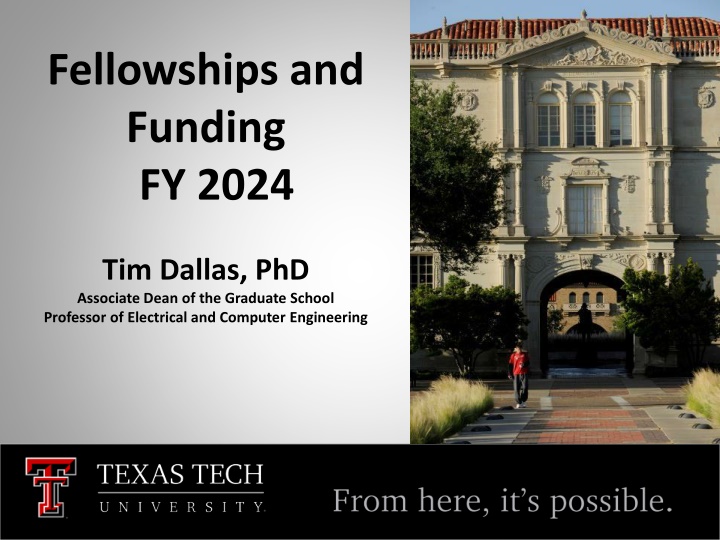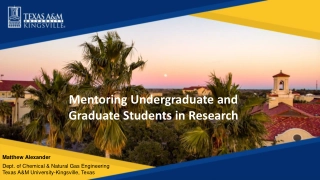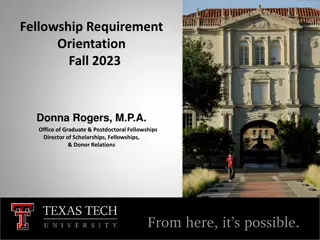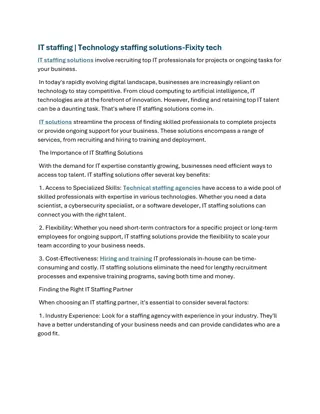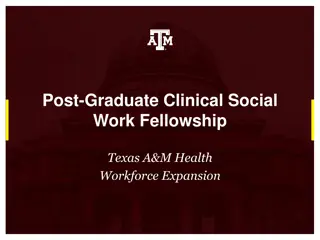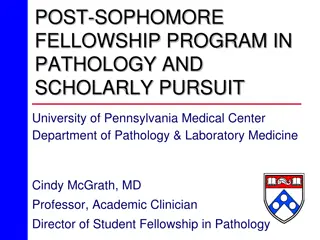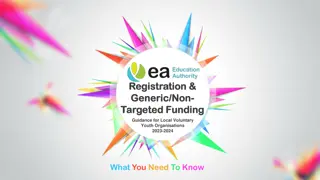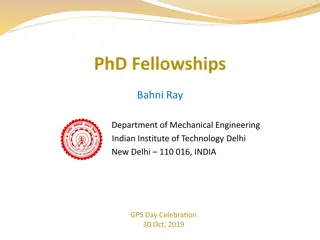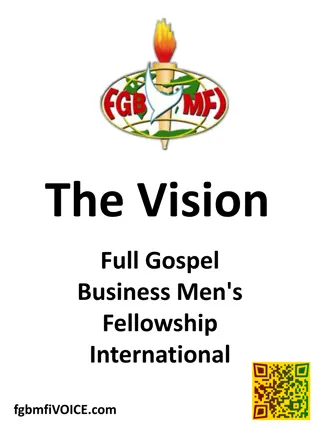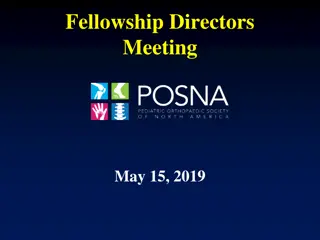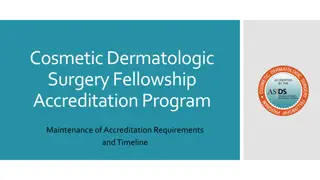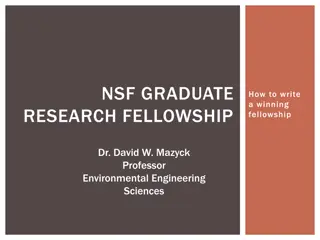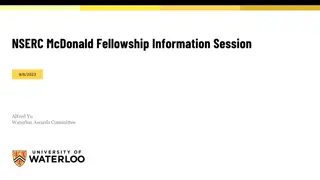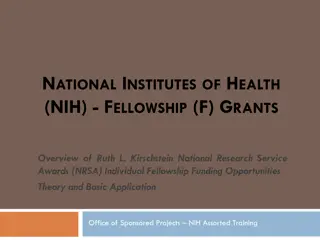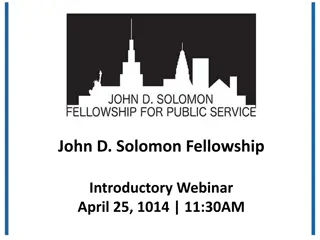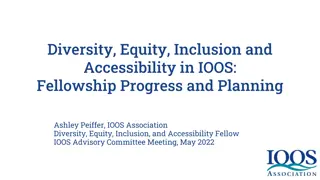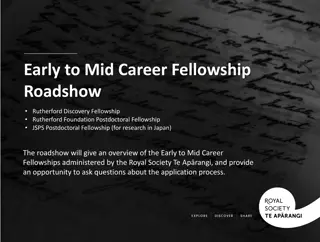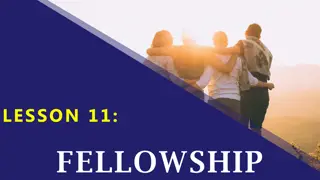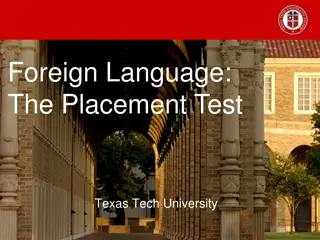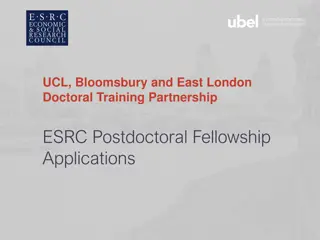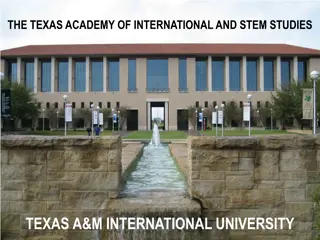Fellowship Opportunities and Funding FY 2024 at Texas Tech University
Explore externally funded fellowship opportunities and awards for graduate students and postdocs at Texas Tech University. Learn about the benefits of applying, available opportunities, and how to search for fellowships in various fields, including STEM. Gain insights into financial support, scholarly enhancement, and institutional growth through fellowship programs.
Download Presentation

Please find below an Image/Link to download the presentation.
The content on the website is provided AS IS for your information and personal use only. It may not be sold, licensed, or shared on other websites without obtaining consent from the author.If you encounter any issues during the download, it is possible that the publisher has removed the file from their server.
You are allowed to download the files provided on this website for personal or commercial use, subject to the condition that they are used lawfully. All files are the property of their respective owners.
The content on the website is provided AS IS for your information and personal use only. It may not be sold, licensed, or shared on other websites without obtaining consent from the author.
E N D
Presentation Transcript
Fellowships and Funding FY 2024 Tim Dallas, PhD Associate Dean of the Graduate School Professor of Electrical and Computer Engineering
Office of Graduate and Postdoctoral Fellowships Assists students and postdocs with finding external funding opportunities and with developing competitive applications Coordinates submission of fellowship applications and award administration Title Name Email Phone Associate Dean Tim Dallas, PhD tim.dallas@ttu.edu (806) 834-6856 Director Fellowships & Scholarships Alumni & Donor Relations Donna Rogers donna.rogers@ttu.edu (806) 834-4079 Fellowship & Scholarship Coordinator Matthew Hurtado matthurt@ttu.edu (806) 834-0770
Graduate Writing Center https://www.depts.ttu.edu/gradschool/gswc.php 806.742.2476, ext. 1 gradwritingcenter@ttu.edu
The Why Why should students apply for externally funded fellowships and other awards? Individual benefits Financial Prestige More opportunities Enhance scholarly activity More publications/performances More funded research projects Institutional benefits Increases graduate student capacity Contributes to stature of university
The Opportunities Comprehensive, multi-year fellowship awards Travel funding for research conferences Short-term/special purpose awards International experiences
Searching for Fellowships Go to www.depts.ttu.edu/gradschool Select Financial Support tab
Significant STEM Fellowships National Science Foundation-Graduate Research Fellowship Program (GRFP): https://www.nsfgrfp.org/ DOD SMART (Science, Mathematics & Research for Transformation) Fellowships: http://smart.asee.org DOD National Defense Science & Engineering Fellowship: http://www.asee.org/ndseg National Physical Science Consortium: http://www.npsc.org DOE Computational Science Graduate Fellowship, http://www.krellinst.org/csgf DOE NNSA Stewardship Science Graduate Fellowship: http://www.krellinst.org/ssgf The Hertz Foundation: http://www.hertzfoundation.org The National GEM Consortium for underrepresented groups: http://www.gemfellowship.org Ruth L. Kirschstein National Research Service Award (NRSA) programs: http://grants.nih.gov/training/nrsa.htm
Competitive Federal Fellowships The US Federal Government supports many fellowship programs for US citizens, US nationals, or permanent residents. National Science Foundation Graduate Research Fellowship Program: $159,000 in stipend and cost-of-education to support research in many science and engineering fields. Fulbright: 6-9 months of support to conduct research, teach, or enroll in a special MS program in over 100 countries. National Institutes of Health Ruth L. Kirschstein Pre-doctoral Individual National Research Service Award: The program enables promising pre-doctoral students with potential to develop into a productive, independent research scientists, to obtain mentored research training while conducting dissertation research.
Texas Techs Fulbright Process Deadline: October, 2024 For Fall, 2025 travel Start early on application (March) Assigned faculty Fulbright mentor Present to TTU Fulbright Committee Rework Submit U.S. citizen by application deadline At least bachelor s degree or equivalent by start of grant http://us.fulbrightonline.org No doctorate by application deadline Proficiency in language of host country (varies by country)
Fulbright US Student Program All Fulbright Grants Include: Round-trip Airfare Monthly Stipend Accident & Sickness Insurance Other Possible Benefits * Tuition Allowance/Waiver Language Training Research Allowance Enhancement Activities Dependent Allowance Disability-Related Accommodations * Varies, depending on grant type and host country For more information, visit: http://us.fulbrightonline.org
NSF GRFP http://www.nsfgrfp.org 3 year: $159,000 Directorates: Biological Sciences Computer & Information Science & Engineering STEM Education Engineering Geosciences Mathematical & Physical Sciences Social, Behavioral & Economic Sciences
2024 NSF GRFP Eligibility Requirements: 1. Citizenship US, nationals or permanent residents of the US 2. Degree Requirements (several) a. Expected start date no later than Fall 2025 b. Senior year to second year of graduate school c. No prior MS unless 2 year break in studies and not enrolled in a graduate school 3. Graduate study leading to research-based master s and doctoral degrees in science and engineering. Review them all!
2024 NSF GRFP Program Information Read and familiarize yourself with the GRFP Program Solicitation: https://www.nsf.gov/publications/pub_summ.jsp?WT.z_pims_id=6201&ods_key=nsf23605 Read and familiarize yourself with the GRFP application site: https://nsfgrfp.org/applicants/application-resources/
NSF Submission Deadlines Fellowship Applications: October ?? - ??, 2024 (varies by discipline) Letters of Reference: October ??, 2024 [5:00 pm ET]
NSF GRFP Applicants submit the following information: Personal Information Education and Other Experience Field(s) of Study Graduate School Information Personal, Relevant Background and Future Goals Statement (3 pages max) Graduate Research Plan Statement (2 pages max) Eligibility Statement (extenuating circumstances) Transcripts Reference Letter writers (3) must be strong
NSF Review Criteria The following elements should be considered in the review for both criteria: 1. What is the potential for the proposed activity to: a. Advance knowledge and understanding within its own field or across different fields (Intellectual Merit) b. Benefit society or advance desired societal outcomes (Broader Impacts) 2. To what extent do the proposed activities suggest and explore creative, original, or potentially transformative concepts?
NSF Review Criteria 3. Is the plan for carrying out the proposed activities well- reasoned, well-organized, and based on a sound rationale? Does the plan incorporate a mechanism to assess success? 4. How well qualified is the individual, team, or organization to conduct the proposed activities? 5. Are there adequate resources available to the PI (either at the home organization or through collaborations) to carry out the proposed activities?
Personal, Background, and Future Goals In this section you are convincing the reviewers that you have exceptional: educational accomplishments experience leadership motivation other positive personal and professional characteristics to successfully carry out the research proposed
Personal, Background, and Future Goals Intellectual Merit Why you? What do you bring that will make you successful, a leader in your field? Describe your previous research experience(s) What did you contribute? What did you learn (e.g., skills experimental, software, hardware, inter-personal, etc.)? Tie in your background (education and experiences) with what you plan to do (future goals).
Personal, Background, and Future Goals Broader Impacts How did you, personally and/or through your past research, impact society beneficially? Reviewers are impressed with what you have done, rather than will do. How do you plan to actively participate/give back to society? Don t exaggerate, be reasonable. Have you had to overcome a unique challenge?
Research Plan Statement Background Topically relevant to the mission of NSF Convey to reviewers that you know what has been done and the significance of the work proposed Do your homework (i.e., literature review) What is considered state-of-the-art or current thinking? What is your motivation for performing the research? Are there important benchmarks to be surpassed? Why is this research important?
Research Plan Statement Intellectual Merit What is significant about the proposed research? What problem will it solve? How will it advance knowledge? How will it impact science/engineering? You are trying to convince a review panel of experts, though not necessarily in the exact area you are working, that your research topic is important enough to award you money and that you have constructed a cogent (clear, logical, rational) plan.
Research Plan Statement Broader Impacts You need to convince a panel that the proposed research will impact society and that you will impact society. Be reasonable and realistic. full participation of women, persons with disabilities, and underrepresented minorities in science, technology, engineering, and mathematics (STEM) improved STEM education and educator development at any level increased public scientific literacy and public engagement with science and technology improved well-being of individuals in society development of a diverse, globally competitive STEM workforce applications of research increased partnerships between academia, industry, and others improved national security increased economic competitiveness of the US enhanced infrastructure for research and education
Research Plan Statement Other suggestions: Make the proposal easy to read with clearly defined sections. Include a brief plan for accomplishing the research. Divide the work into phases and describe the work to be performed in each phase (timeline).
Reference Letters Three reference letters required. Important to ask someone who knows you well enough that they can cite specific examples of your work and/or personal characteristics that support your proposal Ask for letters well in advance - Professors, Intern and Coop Supervisors, Research Supervisors Provide a brief synopsis (no more than a couple of pages) of yourself to your references Personal and academic achievements Activities your references would not be aware of that support your personal characteristics and goals
Take Action Ask not Receive not so go ASK! Identify opportunities Develop essays Compile transcripts Cultivate letters of recommendation Get counsel from faculty and staff Submit compelling applications
